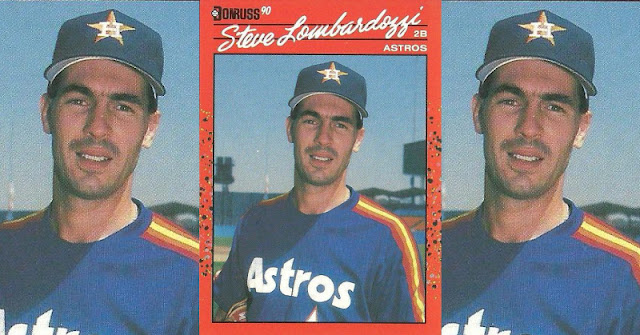Reed Olmstead Interview, Part 1, That Confidence
 |
| Former minor leaguer Reed Olmstead at his Southern California home. Olmstead made it to AA Orlando, but couldn't get higher (G21D Photo) |
SOUTHERN CALIFORNIA - That night's game over, Orlando SunRays manager Ron Gardenhire called a team meeting.
It was June 1990 and the future Minnesota Twins manager was about to make one of his AA future Twins a major league current Twin.
"He was talking about the game and he started talking about Scott Erickson," one of the players in that room Reed Olmstead recalled recently. "He said, 'Scott Erickson, here's your ticket to Minnesota.'
"He got called up to the Twins from our locker room," Olmstead recalled. "So that kind of sunk in - it's close, it's that close."
While Erickson was in his second pro season, making the Twins. Olmstead was in his fifth pro season, getting his first look at AA. And, while he had some success that year at Orlando, Olmstead never did get that call himself.
Olmstead spoke with The Greatest 21 Days recently on the patio of his Southern California home during The Greatest 21 Days July 2012 trip through the state.
 |
| Oneonta, NY's Damaschke Field in 2009. Reed Olmstead played at Damaschke in 1987 as a member of the visiting New York Penn League's Erie Cardinals. (G21D Photo) |
Along the way, Olmstead dealt with the failures that come with the professional game, and the important lessons that came along with them. For Olmstead, it was the lesson of confidence, keeping it up in the face of failure. It's a lesson he is now trying to pass along to his children.
Growing up in Pasadena, Olmstead recalled just loving the game. As a boy, he recalled he couldn't wait until he turned 8. That was the age he'd get to join organized ball.
As a Southern California kid, Olmstead also couldn't wait to watch the Dodger games, a past time he still enjoys. He spoke with that afternoon's Dodgers-Giants game playing out on his television.
"I just loved the game, you know, hitting the ball, pitching the ball, fielding the ball and winning," Olmstead said.
Once he joined a team, Olmstead recalled quickly having success, from making the All-Star team at 10. In ninth grade, he made the junior varsity team.
By 11th grade, Olmstead began to get noticed, both for his hitting abilities and his pitching.
His senior year at Blair High School, Olmstead hit over .500 at the plate and posted a 1.16 ERA on the mound.
 |
| Damaschke Field in Oneonta, NY, in 2009. Reed Olmstead played at Damaschke Field in 1987 as a member of the visiting Erie Cardinals. (G21D Photo) |
As draft day approached, Olmstead recalled multiple teams calling him, asking him where he would play. Would he pitch? Play first base?
"My heart was in playing first base at that time," Olmstead recalled. "I wanted to play every day."
Years later, though, given how his career turned out, Olmstead wondered if he wouldn't have been better off as a pitcher.
But it was as a first baseman that the Cardinals drafted him as. They also thought enough of his skills to take him in the second round of the 1986 draft, 58th overall. It was an achievement, but Olmstead recalled it never really sinking in, not like it would today with near constant coverage of anyone remotely a prospect.
"I remember when I was in high school, you got one line in the local newspaper that day, you cut that sucker out and you put it in the scrapbook," Olmstead recalled. "Now you go on Web sites, Google or whatever, and Google a kid that's never going to get drafted and there's like 15 articles about him."
The other choice Olmstead had to make was whether to go pro at all. For Olmstead, though, it wasn't much of a choice. His mindset all along was to go pro.
School didn't interest him, baseball was his interest.
 |
| A plaque presented to Reed Olmstead and members of the 1986 Johnson City Cardinals in honor of the team's 23-game winning streak that year. (G21D Photo) |
With the Cardinals, Olmstead was sent to rookie Johnson City. There, Olmstead was a member of the Johnson City club that won 23 games in a row.
Olmstead also got a look at what the pro game was about. And how difficult it actually was, the winning streak notwithstanding.
He was still just 17, facing pitchers with college experience and the best young players from Latin America. He hit a respectable .255, but it was the failure that he couldn't get past.
"That was one of my big issues, keeping that confidence up," Olmstead recalled.
In pro ball, Olmstead said, it's easy to go 0 for 20 in a matter of a few games. He recalled one major leaguer going going on a similar cold streak earlier this year.
"That's what separates guys like me sitting in this back yard and guys like them on TV," Olmstead said. "They've got confidence. They knew that it was just a bad time and things were going to get better.
"When I had a slump, I started doubting my abilities."
Go to Part 2, Reed Olmstead, Hit That Pitch
Part 1: That Confidence | Part 2: Hit That Pitch
Note: This was the last of 10 interviews picked up on The Greatest 21 Days' late July 2012 trip to central and southern California.






